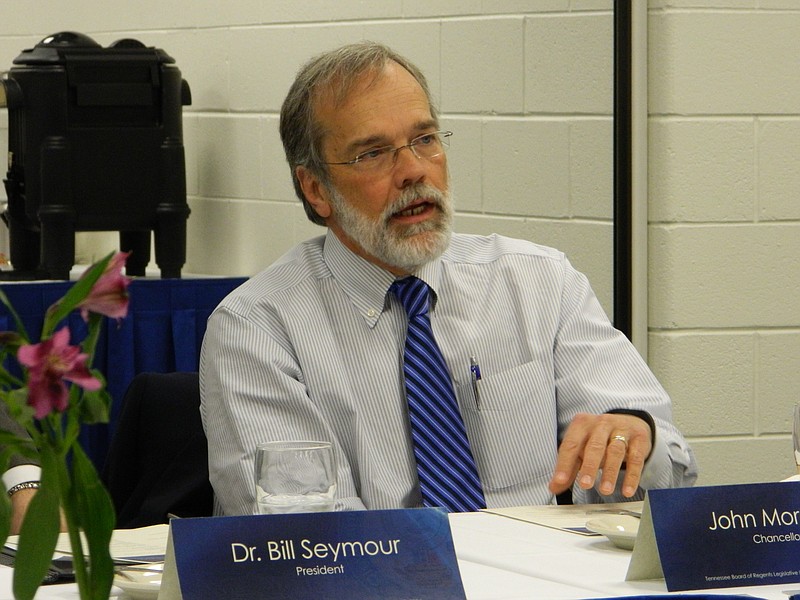NASHVILLE - Chancellor John Morgan plans to resign as head of the Tennessee Board of Regents on Jan. 31 and, in his resignation letter to Gov. Bill Haslam, blasts the governor's plan to break up the system of universities and community and technical colleges.
In his letter Thursday to Haslam and Board of Regents Vice Chairwoman Emily Reynolds, Morgan labeled the move, outlined by Haslam last month, as both "wrong" and "unworkable."
The Republican governor's proposal calls for spinning off the Board of Regents' six universities into self-governing orbits while leaving the 13 two-year community colleges and 27 colleges of applied technology under the board.
Morgan noted he previously told Haslam he planned to retire in 2017, but he said he moved up the date a year in response to Haslam's "Focus on College and University Success Act" proposal. The governor plans to put the proposal before lawmakers as they begin their annual session next week.
"I cannot, in good conscience, continue as chancellor for another year," Morgan wrote.
Haslam's proposal would create independent boards for six state universities currently governed by the Board of Regents. That will allow the board to capitalize on community and technical colleges' successes in making more Tennesseans career ready under his Drive to 55 initiative, Haslam said.
In the news release announcing his retirement, Morgan made no mention of his differences with Haslam. Nor does Haslam, who also is quoted in the release. Neither Morgan, Haslam nor Reynolds would comment beyond Morgan's news release.
But in his resignation letter, Morgan makes his position clear.
"Simply put," Morgan wrote, "I believe the path being proposed is the wrong one for many reasons."
But he said as chancellor he wouldn't "act contrary to the Board's stated interests and objectives and because of my feelings, I would not be in a position to help implement a proposal that, in my view, will do nothing to further TBR's work to accomplish the State's goals.
"I cannot be objective on this topic," Morgan added. "I believe the proposed FOCUS plan is unworkable and will seriously impair the critical alignment of the state's needs, the TBR's oversight responsibility, and each institution's accountability."
Haslam has proposed splitting off the state universities, arguing it would allow the Board of Regents to put "concentrated focus" on its mission while allowing each of the universities to deal with "unique needs and regional economies."
For decades, Memphis leaders have pushed for the University of Memphis to get its own board.
But while Haslam says the independent universities would have oversight by the Tennessee Higher Education Commission, long-time observers well-versed in higher ed politics say it risks creating an "arms race" among the six schools in terms of lobbying and seeking state influence.
And while the University of Memphis and Middle Tennessee State University in Murfreesboro might fare well, other universities may not, according to some lawmakers, lobbyists and others.
Morgan, a 64-year-old former state comptroller and top adviser to former Gov. Phil Bredesen, said that in a nearly 40-year public career, he has "observed that ambiguity is the ally of ineffectiveness and inefficiency. Intentionally, clear accountability was designed as the heart of the Complete College Tennessee Act of 2010."
The CCA, spearheaded by Bredesen, was an effort to change the financial rewards for colleges and universities from enrolling students to actually graduating them.
Morgan doesn't think Haslam's plan will help and suggested the governor explore North Carolina's higher education structure, which offers more local involvement "without destroying the effectiveness and accountability of a comprehensive system focused on the State's agenda."
The Board of Regents has no universities in the Chattanooga area. But Chattanooga State and Cleveland State are part of the board and would remain so under Haslam's plan. The governor's proposal does not directly impact the University of Tennessee system.
Haslam praised Morgan's work.
"With the Complete College Act and the Drive to 55 initiative, the state has been asking more of its higher education system than ever before, and John has guided the Tennessee Board of Regents system admirably since becoming chancellor in 2010," Haslam said in the statement. "I am grateful to John for his service to Tennessee and wish him all the best."
Contact Andy Sher at asher@timesfreepress.com, 615-255-0550 or follow via twitter at AndySher1.
